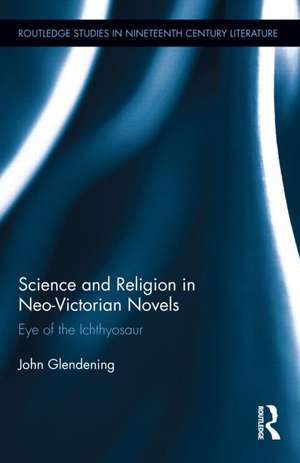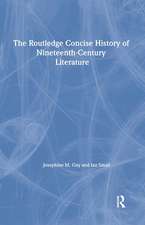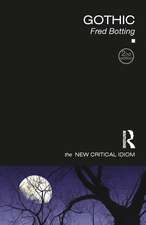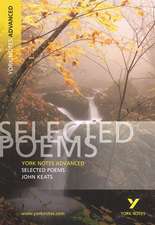Science and Religion in Neo-Victorian Novels: Eye of the Ichthyosaur: Routledge Studies in Nineteenth Century Literature
Autor John Glendeningen Limba Engleză Hardback – 27 mar 2013
| Toate formatele și edițiile | Preț | Express |
|---|---|---|
| Paperback (1) | 386.00 lei 6-8 săpt. | |
| Taylor & Francis – 13 dec 2021 | 386.00 lei 6-8 săpt. | |
| Hardback (1) | 1057.43 lei 6-8 săpt. | |
| Taylor & Francis – 27 mar 2013 | 1057.43 lei 6-8 săpt. |
Din seria Routledge Studies in Nineteenth Century Literature
-
 Preț: 312.54 lei
Preț: 312.54 lei - 9%
 Preț: 935.17 lei
Preț: 935.17 lei -
 Preț: 311.41 lei
Preț: 311.41 lei -
 Preț: 295.25 lei
Preț: 295.25 lei - 18%
 Preț: 1054.71 lei
Preț: 1054.71 lei - 31%
 Preț: 764.20 lei
Preț: 764.20 lei - 26%
 Preț: 765.26 lei
Preț: 765.26 lei - 18%
 Preț: 1000.27 lei
Preț: 1000.27 lei - 28%
 Preț: 876.05 lei
Preț: 876.05 lei - 18%
 Preț: 1054.71 lei
Preț: 1054.71 lei - 18%
 Preț: 1000.27 lei
Preț: 1000.27 lei - 30%
 Preț: 822.54 lei
Preț: 822.54 lei -
 Preț: 442.68 lei
Preț: 442.68 lei - 31%
 Preț: 764.20 lei
Preț: 764.20 lei - 18%
 Preț: 1061.57 lei
Preț: 1061.57 lei - 31%
 Preț: 765.84 lei
Preț: 765.84 lei - 26%
 Preț: 763.39 lei
Preț: 763.39 lei - 18%
 Preț: 1000.27 lei
Preț: 1000.27 lei - 18%
 Preț: 1053.92 lei
Preț: 1053.92 lei - 23%
 Preț: 257.68 lei
Preț: 257.68 lei - 30%
 Preț: 849.27 lei
Preț: 849.27 lei - 31%
 Preț: 763.81 lei
Preț: 763.81 lei - 18%
 Preț: 1000.27 lei
Preț: 1000.27 lei -
 Preț: 373.84 lei
Preț: 373.84 lei - 26%
 Preț: 765.84 lei
Preț: 765.84 lei - 26%
 Preț: 819.09 lei
Preț: 819.09 lei - 18%
 Preț: 1107.61 lei
Preț: 1107.61 lei -
 Preț: 416.22 lei
Preț: 416.22 lei - 31%
 Preț: 762.50 lei
Preț: 762.50 lei -
 Preț: 446.53 lei
Preț: 446.53 lei - 30%
 Preț: 820.40 lei
Preț: 820.40 lei - 18%
 Preț: 1001.07 lei
Preț: 1001.07 lei -
 Preț: 416.22 lei
Preț: 416.22 lei - 18%
 Preț: 1000.27 lei
Preț: 1000.27 lei - 18%
 Preț: 1116.02 lei
Preț: 1116.02 lei - 18%
 Preț: 1001.07 lei
Preț: 1001.07 lei - 18%
 Preț: 999.46 lei
Preț: 999.46 lei - 18%
 Preț: 1109.18 lei
Preț: 1109.18 lei - 30%
 Preț: 848.62 lei
Preț: 848.62 lei - 18%
 Preț: 1109.18 lei
Preț: 1109.18 lei -
 Preț: 414.92 lei
Preț: 414.92 lei - 31%
 Preț: 764.20 lei
Preț: 764.20 lei - 30%
 Preț: 846.50 lei
Preț: 846.50 lei - 18%
 Preț: 1109.18 lei
Preț: 1109.18 lei - 18%
 Preț: 1109.51 lei
Preț: 1109.51 lei
Preț: 1057.43 lei
Preț vechi: 1289.56 lei
-18% Nou
Puncte Express: 1586
Preț estimativ în valută:
202.39€ • 218.46$ • 169.70£
202.39€ • 218.46$ • 169.70£
Carte tipărită la comandă
Livrare economică 19 aprilie-03 mai
Preluare comenzi: 021 569.72.76
Specificații
ISBN-13: 9780415819435
ISBN-10: 0415819431
Pagini: 272
Dimensiuni: 152 x 229 x 20 mm
Greutate: 0.53 kg
Ediția:New.
Editura: Taylor & Francis
Colecția Routledge
Seria Routledge Studies in Nineteenth Century Literature
Locul publicării:Oxford, United Kingdom
ISBN-10: 0415819431
Pagini: 272
Dimensiuni: 152 x 229 x 20 mm
Greutate: 0.53 kg
Ediția:New.
Editura: Taylor & Francis
Colecția Routledge
Seria Routledge Studies in Nineteenth Century Literature
Locul publicării:Oxford, United Kingdom
Public țintă
Postgraduate and UndergraduateCuprins
1. Introduction 2. Reconstructing History: "The World-Renowned Ichthyosaurus" 3. Fossils and Faith: Remarkable Creatures, Ever After, and The Bone Hunter 4. Paradises Lost: The Voyage of the Narwhal and English Passengers 5. Evolution and the Uncrucified Jesus: The French Lieutenant’s Woman 6. True Romance: A. S. Byatt’s Possession and "Morpho Eugenia" 7. Devil’s Chaplain: This Thing of Darkness and Mr. Darwin’s Shooter 8. Victorians and Other Apes: Monkey’s Uncle and Ark Baby 9. Conclusion: Confessing a Murder and Love and the Platypus
Notă biografică
John Glendening is Professor in the Department of English at the University of Montana, US.
Descriere
Criticism about the neo-Victorian novel — a genre of historical fiction that re-imagines aspects of the Victorian world from present-day perspectives — has expanded rapidly in the last fifteen years, but given little attention to the engagement between science and religion. Of great interest to Victorians, this subject often appears in neo-Victorian novels including those by such well-known authors as John Fowles, A. S. Byatt, Graham Swift, and Mathew Kneale. This book discusses novels in which nineteenth-century sciences such as geology, paleontology, and evolutionary theory interact with religion through accommodations, conflicts, and crises of faith. In general, these texts abandon conventional religion but retain the ethical connectedness and celebration of life associated with spirituality at its best. Registering the growth of nineteenth-century secularism and drawing on aspects of the romantic tradition and ecological thinking, they honor the natural world without imagining that it exists for humans or functions in reference to human values. In particular, they enact a form of wonderment: the capacity of the mind to make sense of, creatively adapt, and enjoy the world out of which it has evolved — in short, to endow it with meaning. Protagonists who come to experience reality in this expansive way release themselves from self-anxiety and alienation. In this book, Glendening shows how, by intermixing past and present, fact and fiction, the neo-Victorian narratives in question, with a few instructive exceptions, manifest this pattern.













